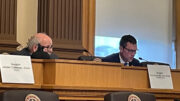By Jeffrey A. Roberts
CFOIC Executive Director
The Estes Valley Voice had been in existence for just four months when it filed its first open-government lawsuit. Now 14 months since it launched in June 2024, the digital news outlet has filed — remarkably — a total of three.
The Voice and editor/publisher Patti Brown sued Estes Park Health last week for withholding public records about payments made to a law firm. After an earlier Colorado Open Records Act lawsuit by the Voice, the hospital district released a letter of intent regarding an affiliation with UCHealth and agreed to pay reasonable attorney fees and court costs to the news organization.

Preceding that was a successful legal fight with the Estes Valley Fire Protection District for hiring a fire chief during an executive session, contrary to a Colorado Open Meetings Law prohibition against making decisions behind closed doors. A judge ordered the fire district to give the Voice a recording of the executive session.
The Voice filed the lawsuits reluctantly, Brown told the Colorado Freedom of Information Coalition. But “keeping government accountable and transparent, that is part of the role of the press. It really is. That’s why it’s protected in the First Amendment,” she said.
“I’m really sad that we have to do it,” added Suzy Blackhurst, the Voice’s senior editor. “But we’re in a community, as in many communities, that was becoming a news desert or on the periphery of that. What has happened is that good, fact-based journalism has dissipated to the point where people don’t expect it anymore.”
Brown and Blackhurst said they started the Voice to do hyper-local stories about the community. Brown had been executive editor of the Estes Park Trail-Gazette, whose staff was cut by owner Alden Global Capital. “I just thought, there’s got to be a better way.” Community members encouraging her “kept looking at The Colorado Sun. Could we do something like that? Could we be digital?”
She enlisted help from her friend Blackhurst, a 39-year resident of Estes Park who had worked at newspapers in the Chicago suburbs, Edwardsville, IL, and in Colorado at the Trail-Gazette and the Windsor Beacon. They established the Voice as a public benefit corporation, as The Sun had been before its recent conversion to a tax-exempt nonprofit.
The news organization, whose writers aside from Brown and Blackhurst are freelancers and interns, is supported by advertising and subscriptions. “We put in quite a bit of funding to begin with,” Brown said, “with the hope and a prayer that this would work.”
Doing accountability journalism in a small town isn’t easy, especially when you’re also willing to go to court over access-to-information matters.
“Somebody said, how can you take neighbors to court? You shouldn’t be suing firefighters,” Brown said. “Well, we didn’t sue firefighters. We completely support our firefighters and our first responders. But the board members did something that they shouldn’t have done … They made a decision behind closed doors.”
The Voice’s early coverage of Estes Park Health, which is run by a public hospital district, included an August 2024 story by Blackhurst in which employees complained about morale problems. Then in October, after the hospital announced it had signed a letter of intent to join the UCHealth medical system, the Voice made three requests for copies of the agreement, all of which Estes Park Health denied by claiming the document was privileged and contained confidential commercial information. The news organization’s lawsuit, filed in March, argued that the letter — as a document “made, maintained or kept” by Estes Park Health — fits CORA’s definition of a public record.
Estes Park Health finally released the letter before a May 8 board meeting to approve the agreement. In a court filing, it stated that it disclosed the letter voluntarily once negotiations with UCHealth had concluded and agreed to pay the Voice’s reasonable attorney fees “rather than incur the much greater expense of proceeding to a hearing.”
The latest lawsuit, filed Aug. 13, came about after the Voice wanted to know how much Estes Park Health paid in legal fees fighting the news organization’s attempt to obtain the letter of intent. Estes Park Heath claims, according to the suit, that its legal counsel invoices do not include the level of detail sought by the news organization and “[m]oreover, those invoices contain confidential and privileged information.”
The Voice argues that attorney-client privilege “does not apply to the entirety of invoices submitted by outside counsel for payment,” and its lawsuit cites numerous court rulings which have held that the amount of the fee and the general nature of services performed are not privileged information. (The Voice is represented in all three lawsuits by media attorney Steve Zansberg, who is president of the Colorado Freedom of Information Coalition.)
Estes Park Health on Friday filed a motion to dismiss the Voice’s latest claims, contending that the news organization did not give the hospital 14 days’ notice of its intent to sue, as required by CORA. The Voice gave the hospital three days’ notice — allowed when there is an “expedited need” for the records — but did not adequately explain why it “had an urgent need to know how much EPH paid its attorneys to defend the prior CORA petition,” the motion says.
In an Aug. 18 news release, Estes Park Health wrote that the Voice’s “litigious approach toward local service districts, including the Estes Valley Fire Protection District and Park Hospital District, and their boards, which are made up of unpaid volunteers trying to meet public needs, results in wasted funds that could be used more productively to provide benefits to taxpayers.”
But at least one member of the hospital district board feels differently about the Voice’s reporting and its efforts to hold Estes Park Health accountable.
“It’s fantastic,” Trustee Tom Leigh told CFOIC. “It’s a shock to the system here in Estes Park because we’ve never had this style of investigative reporting … But I think it was really healthy for the fire board to go through this, as painful as it was, so that they could get to where they’re functioning right. And I think it’s going to be really healthy for the hospital.”
Follow the Colorado Freedom of Information Coalition on X or BlueSky. Like CFOIC’s Facebook page. Do you appreciate the information and resources provided by CFOIC? Please consider making a tax-deductible donation.




